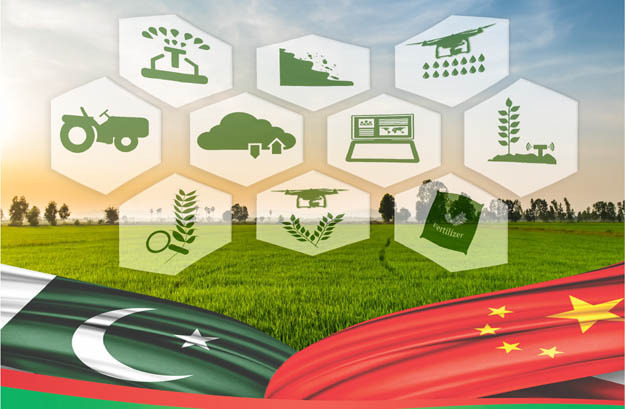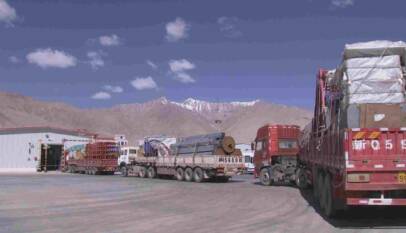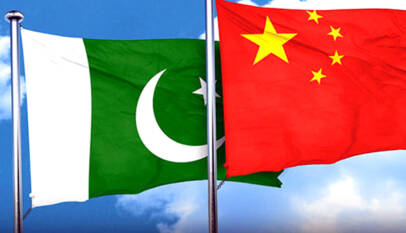Experts: CPEC an opportunity to address food security concerns in Pakistan
A policy dialogue on ‘National Agriculture and Food Security in Pakistan’, noted that the 2nd phase of CPEC is important to promote agricultural development of Pakistan. There is a dire need that experts devise strategies to un-tap the potential in production and export of agricultural commodities. CPEC is a golden opportunity to serve the national food security and grab the international markets. For that matter, various measures need to be adopted such as local capacity building initiatives, discouraging urbanization and public awareness campaigns regarding food security concerns threatened by climate change.
Islamabad : The China–Pakistan Economic Corridor is a collection of infrastructure projects, is improving Pakistan’s connectivity not only within itself and China, but with over 60 other countries, which are part of the land route of China’s Belt and Road Initiative involving infrastructure development and investments.
With the second phase of the Chinese venture presenting opportunities to collaborate in the social sector, substantial emphasis needs be laid on the development of the country’s agriculture sector, which offers huge prospects of growth and trade.
The message emerged from a policy dialogue on ‘National Agriculture and Food Security in Pakistan’, which was held at Institute of Policy Studies (IPS) here in collaboration with Pakistan Agriculture Scientists Forum (PAS Forum). The session was addressed by Dr Muhammad Azeem Khan, chairman, Pakistan Agricultural Research Council (PARC); Professor Dr Anwar-ul-Hasan Gilani, vice chancellor, University of Haripur and ex-chairman, Pakistan Council for Science and Technology (PCST); Professor Dr Amanullah Malik, University of Agriculture, Faisalabad; Khalid Rahman, Executive President IPS; and Dr Abdul Wakeel, president, PAS Forum.
Presenting an overview of Pakistan’s agriculture sector, Dr Azeem Khan emphasized the need of enhancing productivity of various potential sub sectors of agriculture, not only with an aim to address the country’s food security concerns, but also to alleviate it for international trade.
Khan rued that Pakistan was a food exporting country till 2013 but became a food importing country thereafter. However, he observed that the second phase of China-Pakistan Economic Corridor offers a good opportunity to help the agriculture sector to recover, but the onus largely lies with the nation to set targets and strategies carefully in order to benefit from the forthcoming opportunities.
The PARC chairman was all for alleviating the agriculture sector via business-oriented model, which in his opinion, could only be done through value addition i.e. converting raw materials into standard commercial products and brands. He highlighted that combinations of different commodities and products being produced alongside the CPEC routes boast significant prospects in this regard. There is a huge potential for the production and export of fodder, edible oils and palm oil, whereas pulses and oil seeds are some other lucrative areas to invest in.
The speaker however pointed out that the post-harvest losses still remain a concern in the country, before adding that the solution lies in careful measures taken in the areas of production, diversification, post-harvest handling, processing, certification, and value addition – all aimed at converting the harvest into high-value products while enabling them to maintain apex standards for international trade.
Khan also spoke fervently about the prevalent state of malnutrition in Pakistan, terming it unprecedentedly high while maintaining that a nutritionally food secure Pakistan should be the country’s top most goal.
Dr Malik spoke about potentials and opportunities for Pakistan’s agricultural sector in relevance to CPEC mega projects. He mentioned several agriculture items in which Pakistan could enjoy a competitive advantage over the rest of the world, especially when it comes to China.
The professor said that China is the world’s biggest farm produce importer, with its imports making up to 10 % of global farm produce trade. The country is a net importer of bulk agriculture products and there has been rapid growth in its imports from Belt and Road countries off-late. Pakistan too can target some of its exports to China such as soybean, barley, corn, wheat and cereals. Rice is the country’s major export to China but there is a lot more potential to it as well. In terms of fruit, cherries, grapes, mangoes, guavas and oranges are some of the products that can be looked at. He however said about 70% of China’s agriculture imports come from the USA, Brazil, South East Asia, European Union and Australia, and it will be very challenging, yet necessary, to raise our quality standards to compete with these countries.
Pakistan was sorely lacking in utilizing technology for its agricultural requirements when compared to other countries, Dr Gilani lamented while pressing for the need to make use of modern technological systems and methods that could cope with present-day challenges like global warming and climate change.
He stressed the need for focusing and investing on local capacity building initiatives as well as on improving access to international markets.
The expert called for immediate measures such as making crops nutritive and resilient to climate change, rescuing of more farmland, empowering of small landholders, de-urbanization, preservation of water, recycling of crop/livestock waste and saving of food through public awareness drives if Pakistan is to answer its rising food security threats.
Ambassador Khalil Hashmi underscores China’s leadership in global economic development
Major initiatives and visions proposed by China align with current global needs and trends…












